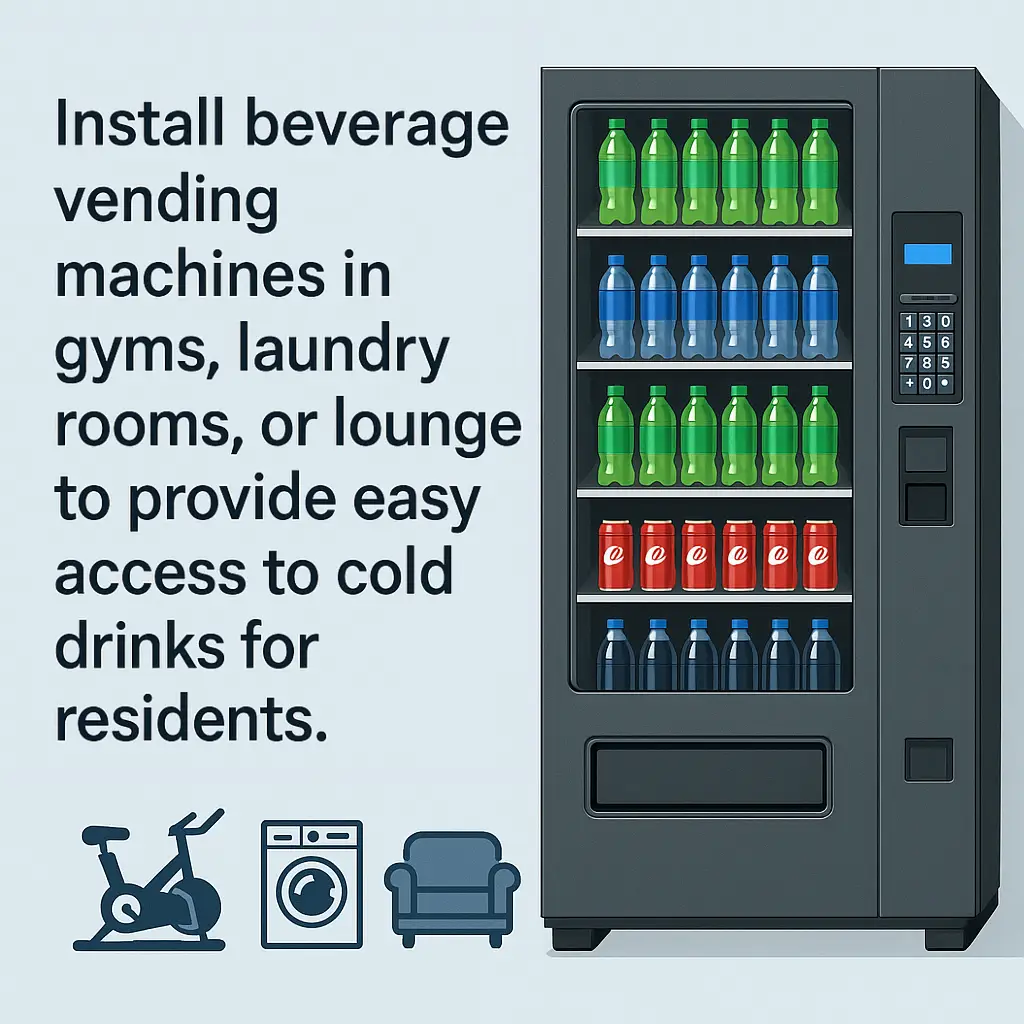Beverage Vending Machines for Apartment Common Areas
Install beverage vending machines in gyms, laundry rooms, or lounges to provide easy access to cold drinks for residents.
Back to Vending for Apartments ResourcesInstall beverage vending machines in gyms, laundry rooms, or lounges to provide easy access to cold drinks for residents.
Back to Vending for Apartments ResourcesThe best locations for beverage machines in apartment buildings include gyms, laundry rooms, clubhouses, and shared lounges—areas with high traffic where residents appreciate cold drinks nearby. These spots also ensure visibility and consistent usage, leading to better vendor service and inventory turnover.
![]() Drinks available 24/7 in convenient on-site locations
Drinks available 24/7 in convenient on-site locations
![]() Modern machines offer contactless and cashless payments
Modern machines offer contactless and cashless payments
![]() Smart vending reduces maintenance calls with automatic alerts
Smart vending reduces maintenance calls with automatic alerts

Adding beverage vending machines to apartment common areas is an easy way to improve resident satisfaction while offering convenient access to drinks. Whether it’s a gym, laundry room, or lounge, cold drink machines make these high-traffic areas more functional and enjoyable for tenants.
Most property managers choose combo or glass-front beverage machines, which can stock a mix of soda, water, juice, and energy drinks. These machines are ideal for apartment communities because they can accommodate multiple drink preferences and have modern payment options—including contactless and mobile wallets—that residents expect today.
One major benefit of installing these machines is that vendors typically handle everything: delivery, installation, stocking, and maintenance. In fact, many providers offer this service at no cost to qualifying properties. It’s a low-effort way to upgrade amenities without committing to additional expenses or management burdens. Machines are usually installed within a week, and replacements are simple if the existing vendor isn’t performing well.
Common complaints like expired drinks, broken buttons, or machines that constantly run empty are avoidable with the right vending partner. Thanks to smart technology, modern vending units can report stock levels and errors in real-time, helping vendors act faster with fewer resident complaints.
If you're worried about logistics or vendor responsibilities, a managed service agreement may add peace of mind. These agreements ensure the vendor adheres to clearly defined service levels and maintenance timelines. Learn more about how these arrangements work on our page about vendor contract terms.
Property managers in small settings can also benefit. Even if your building hosts just 20 or 30 residents, vending setups are still feasible. For smaller deployments, visit our article on vending in smaller communities or offices.
If you're exploring vending options for your business, Vending Exchange can help simplify the process. Delivery, Installation and Equipment is provided at no cost to you - vendors provide the machines, keep them stocked, and handle all servicing. Whether you need a provider or full-service management, just fill out the form on this page to get started.
The best spots include gyms, laundry rooms, and resident lounges—areas with frequent foot traffic.
Not usually. Most vendors offer free installation, equipment, and restocking to qualified locations.
Common options include bottled water, soda, sports drinks, juices, and energy beverages.
Vending setups are typically completed within 7 days of approval and location validation.
Vendors are responsible for maintenance and repairs, often alerted automatically by smart machine features.
Yes—modern beverage machines support contactless payments like Apple Pay, Google Pay, and cards.
You can request a replacement vendor through services like Vending Exchange, often with no extra cost.
Choose vendors that use smart inventory tracking and have agreed service levels or managed plans.
Yes—vending is viable even with fewer residents if placed in high-use areas and stocked appropriately.
No—vendors handle restocking, maintenance, and service as part of their offering to apartment buildings.